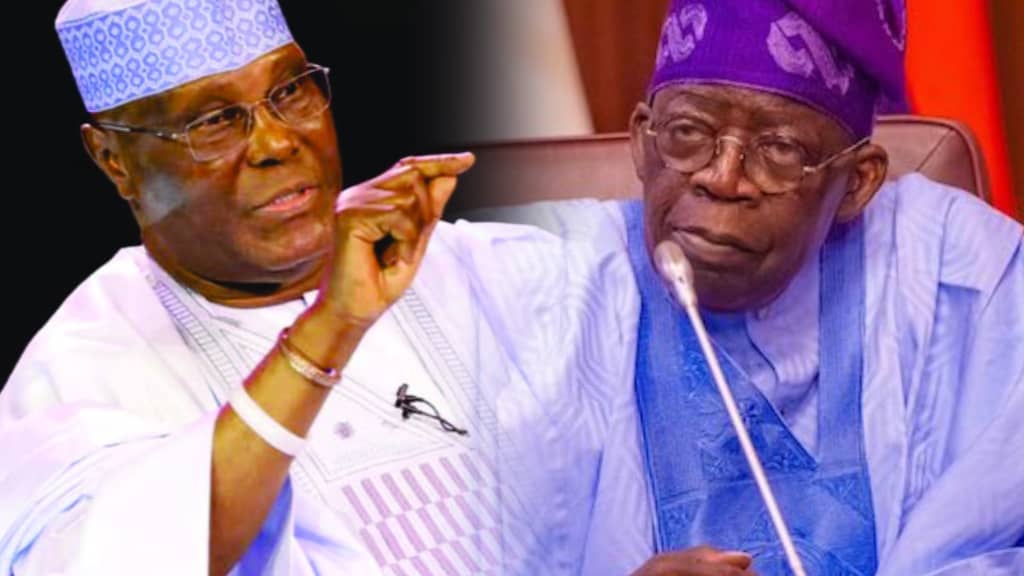Nigeria
Atiku Criticizes FG’s 2025 Budget, Says It Falls Short of Solving Nigeria’s Problems

Former Vice President Atiku Abubakar criticizes the Federal Government’s 2025 budget, claiming it lacks the capacity to address Nigeria’s pressing challenges.
Former Vice President Atiku Abubakar stated that the N49 trillion budget proposal for 2025, presented to the National Assembly last week by President Bola Tinubu, is a flawed plan. He believes it lacks the ability to promote sustainable economic growth and address Nigeria’s deep-seated issues effectively.
In a sharp critique delivered on Sunday, he described the budget as perpetuating “business-as-usual fiscal practices,” which are ineffective in promoting sustainable growth or tackling Nigeria’s developmental shortcomings.
The 2025 budget anticipates a revenue of N35 trillion and projects a deficit surpassing N13 trillion, which amounts to 4% of the country’s Gross Domestic Product (GDP).
To address this shortfall, the administration intends to secure over N13 trillion through borrowing, with N9 trillion coming from direct borrowings and an additional N4 trillion from project-specific loans.
Atiku condemned this dependency on debt, asserting that it resembles the unsustainable borrowing patterns of previous administrations. These trends have resulted in escalating public debt, higher interest payments, and vulnerabilities in foreign exchange.
He pointed out several significant flaws in the budget, questioning its ability to bring about meaningful change.
These encompass fragile budgetary foundations, which he indicated as a warning sign for the inadequate implementation of the 2024 budget affecting prospects in 2025.
He mentioned that by the third quarter of 2024, under 35% of the capital expenditure designated for Ministries, Departments, and Agencies (MDAs) had been distributed, despite assertions of achieving an 85% budget execution rate.
“This shortfall in capital expenditure weakens the government’s capacity to execute transformative projects,” Atiku remarked, expressing skepticism about the government’s ability to achieve its 2025 goals.
The ex-vice president also expressed worry over the imbalance in debt servicing, noting that it will account for N15.8 trillion, or 33% of total spending, almost matching the N16 trillion allocated for capital projects.
Atiku highlighted the imbalance in priorities, pointing out that spending on debt servicing surpasses allocations for crucial sectors like defense (N4.91 trillion), infrastructure (N4.06 trillion), education (N3.52 trillion), and health ( N2.4trillion).
He cautioned that this type of misallocation might hinder development and lead to ongoing cycles of borrowing.
Recurrent expenditure in 2025 is projected to exceed N14 trillion, representing 30% of the budget, which has been deemed unsustainable.
Atiku criticized the spending on what he described as an “oversized bureaucracy” and inefficient public enterprises, arguing that it left little room for development investments.
He noted that by not addressing inefficiencies and reducing waste, the government is undermining fiscal stability.
READ ALSO: State House Earmarks ₦15.09bn for Vehicle Tyres, Office Complex in 2025 Budget
He observed that allocating only 25% to 34% of the total budget for capital spending is insufficient to tackle Nigeria’s infrastructure deficit.
Atiku contended that the budget was insufficiently transformative to drive growth and address Nigeria’s infrastructural and economic challenges, with an average per capita capital allocation of only N80,000 (around $45).
The former vice president condemned the administration’s choice to raise the Value Added Tax (VAT) rate from 7.5% to 10%, calling it a “backward step” that would exacerbate the cost-of-living crisis.
He contended that increasing tax burdens on financially strained Nigerians, without tackling governance inefficiencies, would suppress domestic consumption and place additional pressure on the economy.
The presidential candidate of the Peoples Democratic Party (PDP) in the 2023 election concluded that the 2025 budget lacks the structural reforms and fiscal discipline necessary to tackle Nigeria’s complex challenges.
He stated that the government should focus on minimizing inefficiencies, addressing contract inflation, and striving for long-term fiscal sustainability.
Atiku advocated for a move away from unsustainable borrowing and excessive recurrent spending towards a fiscal strategy that emphasizes growth, concentrating on infrastructure, education, and health.
He called on the government to implement a more disciplined budgeting approach, stressing the importance of adopting policies that foster economic transformation instead of continuing a cycle of debt and stagnation.
He stated, “Nigeria requires a reliable budget that addresses our challenges realistically and provides solutions based on efficiency, accountability, and growth.”
